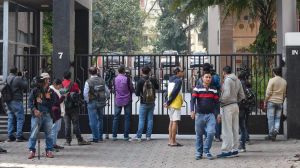Burmese days
It was only fitting that I should arrive in Yangon on the 61st Armed Forces Day Anniversary. Like for many outsiders...

It was only fitting that I should arrive in Yangon on the 61st Armed Forces Day Anniversary. Like for many outsiders, the ruling military junta ironically known as the State Peace and Development Council SPDC embodied Myanmar for me. Its brutal and benighted policies have bequeathed Myanmar violence, poverty, and an international boycott. But in travelling behind Myanmar8217;s iron curtain, I discovered a dynamic and colourful society steeped in the past, where many anchor their hope in faith and the foreign.
One need not be in Myanmar to feel the SPDC8217;s long arm8230;Restrictions and propaganda can however be evaded or ignored by locals; bread and butter issues cannot. With the government8217;s spontaneous move from Yangon to the newly built capital Pyinmana, squandered money for many, it is luring employees along with a pay raise. The army8217;s 8220;retreat into the jungle8221; darkly amuses many locals checked by the fear that money will be printed to match the pay hikes inflating basic commodities8217; prices. And then there are eight-hour daily power cuts in Yangon, where the streets descend into darkness at night with many lighting lanterns and the lucky few cranking on generators. With energy prices having gone up nine-fold last year, keeping the lights on is an achievement.
The international boycott has not helped. US official estimates suggest that its ban of Myanmar imports in 2003 cost some 40,000 textile worker jobs and US350 million RM1.3 billion in imports. Per capita income is among the lowest in Asia at US225 RM821. Beggars wander listlessly in the streets sifting through garbage; business doldrums plague storeowners. Yangon remains in a time warp8230;
In Orwell8217;s Burmese Days set in the British colonial era, the timber merchant Flory bemoans Burma8217;s modernisation: 8220;Sometimes I think all this will be gone8230;forests, villages, monasteries, pagodas all vanished. And instead, pink villas fifty yards apart 8230; villa after villa with all the gramophones playing the same tune.8221; Flory8217;s words do not ring true just yet and a 8220;special feeling8221; remains in Myanmar as per one German tourist. One savours its traditional flavour in a flat world where things can also appear, taste, and sound homogenously flat.
But the pleasure is a guilty one because Myanmar8217;s charm dangerously blurs with the antiquated, underdeveloped and impoverished. Under an iron fist, its people lack choice from brand to ballot. Bitter disillusionment surfaces in conversations while faith and the foreign provide some reprieve. One can only hope that someday Myanmar8217;s people will overrule and eclipse the SPDC; that the world will come to enjoy their warm hospitality and heritage instead of being averted by the junta8217;s abominable antics.
The writer is a Fulbright Scholar based in Malaysia.
A longer version of this piece appeared in 8216;The Sun8217;, Malaysia
- 01
- 02
- 03
- 04
- 05































